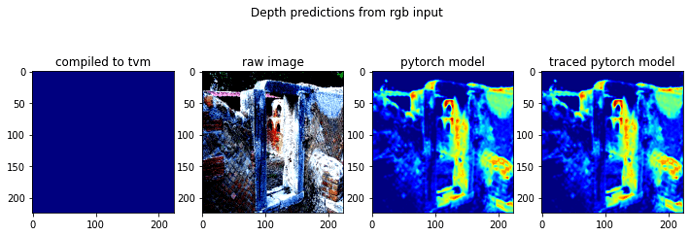That’s great! Currently I am only interested in testing the API, to me it is totally fine to have comparable results to plain PyTorch models.
I would love to learn more about how I can get my models compiled on tvm and running on nvidia GPUs.
I have been trying to compile MiDaS on GPUs like V100 and RTX2080 earlier today. I can’t say that it did not work at all, but the output of the compiled model was always filled with zeros. So I wanted to test my script with a simpler network but got the same results.
Below is my simple test case and the results that I get:
The basic model
class SimpleNet(torch.nn.Module):
def __init__(self):
"""
A simple model to explore the behaviour of the tvm compiler
"""
super(SimpleNet, self).__init__()
self.in_layer = torch.nn.Conv2d(3, 10, 3, padding = 1)
self.out_layer = torch.nn.Conv2d(10, 1, 3, padding = 1)
self.relu = torch.nn.ReLU(inplace=True)
self.init_weights()
def forward(self, x):
l1 = self.relu(self.in_layer(x))
out = self.relu(self.out_layer(l1))
return out
def init_weights(self):
for m in self.modules():
if isinstance(m, torch.nn.Conv2d):
torch.nn.init.ones_(m.weight)
One of the configurations I have tried out
model = SimpleNet().cuda().eval()
script_model = torch.jit.trace(model, img.cuda()).eval()
input_name = "input0"
shape_list = [(input_name, img.shape)]
mod, params = relay.frontend.from_pytorch(script_model, shape_list)
target = tvm.target.cuda(model="nvidia/teslaV100", options=['-keys=cuda','-arch=sm_80','-max_num_threads=1024', '-thread_warp_size=32'])
target_host = 'llvm'
ctx = tvm.gpu()
with tvm.transform.PassContext(opt_level=3):
graph, lib, params = tvm.relay.build(mod,
target=target,
target_host=target_host,
params=params)
m = tvm.contrib.graph_runtime.create(graph, lib, ctx)
m.set_input(input_name, tvm.nd.array(img, ctx))
m.run()
tvm_output = m.get_output(0)
The result
tvm_output.asnumpy()
array([[[[0., 0., 0., ..., 0., 0., 0.],
[0., 0., 0., ..., 0., 0., 0.],
[0., 0., 0., ..., 0., 0., 0.],
...,
[0., 0., 0., ..., 0., 0., 0.],
[0., 0., 0., ..., 0., 0., 0.],
[0., 0., 0., ..., 0., 0., 0.]]]], dtype=float32)
Kindly note that the results of pytorch and its jit-compiled version are as expected.
The warnings
After the compilation, I had seen the following warnings about how the compiler could not find the right config. But since I got the same warnings at cpu side and did not get the blank output there, I have ignored them. Performance of the model is pretty close to PyTorch on CPU in terms of speed as well.
Cannot find config for target=cuda -keys=cuda,gpu -arch=sm_80 -max_num_threads=1024 -model=nvidia/teslaV100 -thread_warp_size=32, workload=('conv2d_nchw.cuda', ('TENSOR', (1, 3, 224, 224), 'float32'), ('TENSOR', (10, 3, 3, 3), 'float32'), (1, 1), (1, 1, 1, 1), (1, 1), 'float32'). A fallback configuration is used, which may bring great performance regression.
Cannot find config for target=cuda -keys=cuda,gpu -arch=sm_80 -max_num_threads=1024 -model=nvidia/teslaV100 -thread_warp_size=32, workload=('conv2d_nchw.cuda', ('TENSOR', (1, 10, 224, 224), 'float32'), ('TENSOR', (1, 10, 3, 3), 'float32'), (1, 1), (1, 1, 1, 1), (1, 1), 'float32'). A fallback configuration is used, which may bring great performance regression.
/usr/local/lib/python3.6/dist-packages/ipykernel_launcher.py:24: DeprecationWarning: legacy graph runtime behavior of producing json / lib / params will be removed in the next release. Please see documents of tvm.contrib.graph_runtime.GraphModule for the new recommended usage.


